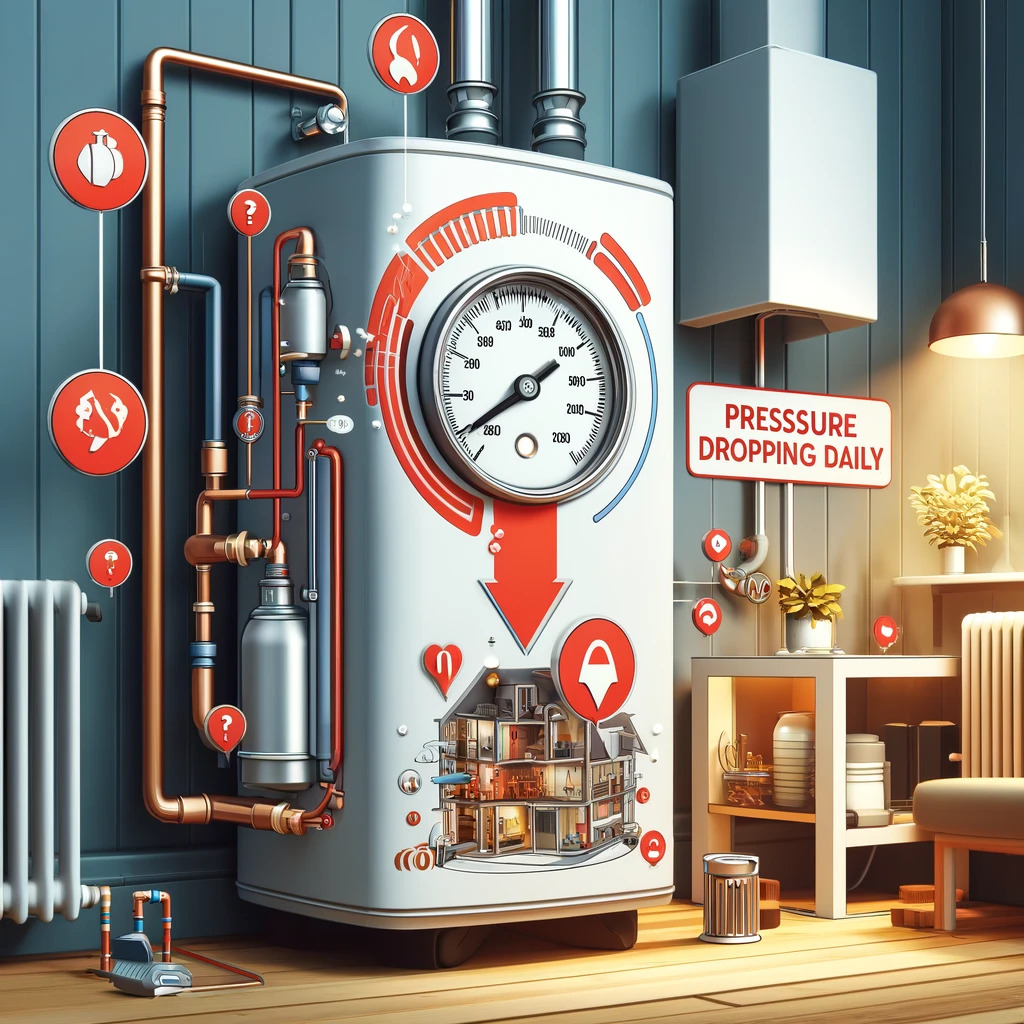While it’s fairly common for boiler pressure to drop slightly, a sudden or frequent fall in pressure could be a sign of a problem with your system. It’s important to know what to look out for so that you can get the help you need quickly.
Remember that bleed radiators can also cause low pressure – if you’ve recently bled your radiators, then this might explain why your boiler is losing pressure.
Why Does My Boiler Keep Losing Pressure
1. Leaking Radiator –
If you’re losing pressure on your boiler every day, one of your radiators may be leaking. While it is quite common for central heating systems to leak a little water over time, if the problem becomes serious, then you’ll likely need to call in a gas-safe engineer to repair it.
Most radiators have a valve on the bottom of them, which is used to control the flow of hot water. Over time, these valves can become faulty or worn out, which is when they begin to leak. A simple way to check if this is the case is to turn the valve off completely and then dry off the area around it to see if any water remains there. If there is, then you’ll probably need to replace the valve, which is a relatively cheap job.
A leaking radiator can also be caused by a damaged thermostat, which, again, is a fairly easy fix. However, if the problem is due to a hole in the radiator itself, then this will be more expensive and take a little longer to resolve.
There is a chance that your boiler has lost pressure due to a recent bleed of the radiators or because of a fault with your expansion vessel. Bleeding your radiators is a necessary part of boiler maintenance, but it can cause the pressure to drop. If you bleed all your radiators and the pressure still drops, then this is likely due to the expansion vessel losing its charge. This should be checked and re-pressurised during your annual boiler service.
A low-pressure boiler can’t explode, but if it continues to lose pressure, then this could cause damage to your heating system and lead to higher fuel bills. The best thing to do is to re-pressurize the boiler, but if this doesn’t work, then you should have a professional look at it. It’s worth remembering that it is very dangerous to operate a boiler with too low of pressure as this can cause significant damage to the whole of your heating system and can be harmful to you, too.
2. Faulty Pressure Relief Valve
The pressure relief valve is a safety device that opens when the system reaches high levels of pressure. If the valve is damaged, it can cause high-pressure fluctuations that could harm your boiler or heating and plumbing systems. This type of problem typically involves a broken spring or a valve that’s not closing properly. If you hear strange noises or feel that your water pressure has dropped, it’s a good idea to contact a professional.
Another common cause of boiler pressure loss is the presence of air in the system. This may be due to a need to bleed the radiators, which can release air into the system, or it could be caused by a defective expansion vessel or a leak in the auto air vent. In either case, it’s essential to get these issues resolved as soon as possible to prevent damage and maintain adequate boiler pressure.
It’s also important to know when it’s a simple re-pressurizing technique and when the issue is a more serious problem that requires the services of a professional. Trying to fix complex issues yourself can lead to further problems, so it’s best to let a Gas Safe registered engineer handle any serious repairs.
Finding the source of a boiler drop in pressure can be a difficult task, especially because many of the pipes that run throughout your home are hidden behind walls and under floors. Start by locating the pressure gauge and checking its reading. Ideally, it should be above 2 bars with the needle pointing to the red zone or vertical if you have an old clock dial-type gauge.
If the pressure isn’t high enough, it’s time to check your radiators and piping for any signs of leaking. Look for damp spots on the wall or floor around any areas where hot water pipes appear and connect to radiators, taps, or appliances that use the boiler’s water supply. Once you find the source of the leak, you can call a plumber to repair it. It’s always better to do this before the problem gets worse and causes more expensive damage.
Also Read: – Combi Boiler vs System Boiler
3. Faulty Expansion Vessel
If you’ve had your boiler serviced recently and the pressure gauge shows an ideal reading, but it continues to drop every day – this could be due to a problem with your expansion vessel. This is the pressure-holding component within your heating system that prevents sudden changes in pressure from occurring. If this is faulty, it will cause the internal bladder that holds air or nitrogen to leak out over time. Usually, this isn’t immediately obvious, but over a few weeks, the pressure in your boiler will slowly decrease.
The expansion vessel, which is built into the boiler or attached to the central heating pipework, works by having an internal bladder that is separated by a diaphragm from an empty chamber. The internal bladder, which is typically made of neoprene rubber (this type of rubber resists deterioration better than natural or synthetic rubber), needs to be inflated with air or, ideally, nitrogen. This level of air or nitrogen, known as the vessel’s charge, must be maintained by annual boiler maintenance; otherwise, it will dissipate completely, resulting in ongoing low-pressure issues with your central heating system.
A faulty expansion vessel is often caused by corrosion, but it can also be a result of the internal diaphragm failing. If this occurs, water can expand and create a build-up of pressure that isn’t restricted by the pressure vessel. When this happens, the pressure valve will discharge water to prevent the system from overheating and causing damage. This will also cause the expansion vessel to lose its charge, causing the pressure gauge on your boiler to drop rapidly.
To test if your expansion vessel is faulty, switch off your boiler and isolate the electrical power to it. Open the drain cock and then turn on one of your downstairs or upstairs radiators. Once the water is hot, open your filling loop and let it fill up to about 1 bar. You should hear air bubbling out of the drain cock; this is because the boiler is pumping up its air chamber; if you don’t, then it is almost certain the expansion vessel diaphragm has failed.
Also Check: – Emergency Boiler Repair London
4. Faulty Filling Loop
A certain level of pressure is needed to keep water flowing around your heating system and out of your taps. Without it, your boiler and central heating would not function at all. However, a drastic drop in boiler pressure can indicate that there is a problem with your system.
It could be something as simple as a leak, or it could be more serious. In either case, a Gas Safe-registered engineer should be called in to investigate and find the root of the issue.
When it comes to your boiler, the pressure is controlled by the filling loop, which connects to the mains and the boiler itself. The loop has two valves which, when open, allow water to enter the system and raise the pressure. However, if these valves are left open accidentally, it may lead to too much water entering the system, and the pressure will rise too high. This is not good for the boiler, so it is important to close both of these valves when re-pressurizing your boiler.
You should always check the pressure gauge on your boiler regularly. It should be located on the front panel of your boiler and will be marked with several bars (depending on the model). The needle should be positioned vertically in the middle of the scale, which is the ideal pressure for most boilers.
If you notice that your boiler is losing pressure, you should first check your home piping and radiators for any signs of leaks. Check any electrical devices that use hot water and look for damp spots on walls or floors in these areas.
Once you have found the source of the leak, you can contact a professional plumber to repair it. Leaking pipes can cause significant damage to your property, so it is important to catch the problem quickly.
Topping up your boiler to restore the pressure is a short-term solution. Introducing oxygen into your system can make the problem worse, which accelerates corrosion. The best thing to do is to get the problem fixed by a professional rather than topping up your boiler constantly. This will prevent further damage and save you money in the long run.
When the pressure gauge on your boiler is registering under 2 bars, it means your system is losing pressure. Consistently dropping pressure can cause several issues, from insufficient heating performance to total system shutdown.
Topping up your pressure is a simple task that can be done at home. However, if the issue persists, it could indicate a serious problem with your expansion vessel or a malfunctioning pressure relief valve.
Also Check: – New Boiler Installation London
Advanced Boiler Pressure Troubleshooting:
- Persistent Low Pressure and Potential Causes – Persistent low pressure suggests water leaks from the pipes, radiators, or even the boiler unit itself.
- DIY Checks and Leak Diagnosis – A pressurization can often rectify a single drop of pressure, but persistent pressure dips usually indicate a deeper issue with your heating system. Fortunately, there are several DIY checks you can carry out to help determine what’s causing the problem.
- Pressure Relief Valve Testing – Another cause of boiler pressure issues is a malfunctioning pressure relief valve. These valves are designed to release excess pressure from the system, but they can sometimes release too much and cause the boiler to lose pressure.
- Expansion Vessel Diagnosis and Air Pockets in the System – Similarly, an expansion vessel with a faulty diaphragm can also lead to pressure fluctuations in your system. In these instances, you’ll need to bleed a radiator or two to dispel air pockets disrupting the system’s balance and leading to a drop in pressure.
- System Repressurisation and Further Diagnostics – Repressurizing the system is often enough to remedy the issue of constant drops in boiler pressure, as it will re-inflate the expansion vessel and restore the correct level of water.
- Expansion Vessel Charge and Maintenance – The expansion vessel – usually filled with air or, better still, nitrogen (to prevent corrosion) – is designed to hold up the pressure in the heating system. Over time, however, the internal bladder can lose its charge, leading to pressure losses and a loss of efficiency.
Conclusion
While minor fluctuations in boiler pressure are normal, consistent drops in pressure often signal underlying issues within your heating system. Whether it’s due to leaks in radiators, a faulty expansion vessel, or a malfunctioning pressure relief valve, it’s important to diagnose and address the problem quickly to avoid further damage. Regular maintenance and timely intervention can save you from more costly repairs down the line.

Sunny Saini is a certified heating engineer with over 15 years of experience in maintaining and repairing boilers. He specializes in diagnosing complex boiler issues and providing reliable solutions to ensure homeowners stay warm and comfortable throughout the year.





![]=](https://localboiler.co.uk/wp-content/uploads/2024/05/Untitled-design-96-300x300.jpg)